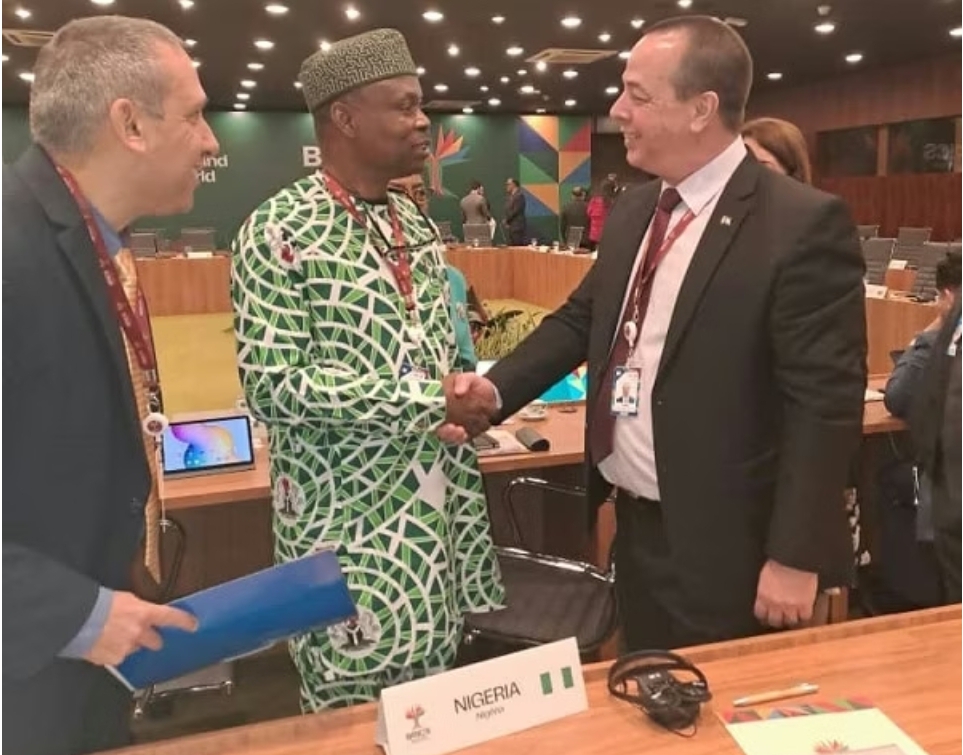Nigeria seeks stronger BRICS health collaboration
Nigeria has called for deeper collaboration among BRICS countries in the face of mounting global health challenges, citing the urgent need for shared solutions to issues that no country can tackle alone.
The BRICS is a group formed by Brazil, Russia, India, China, South Africa, Saudi Arabia, Egypt, the United Arab Emirates, Ethiopia, Indonesia, and Iran.
It serves as a political and diplomatic coordination forum for countries from the Global South and for coordination in the most diverse areas.
Speaking at the 15th BRICS Health Ministers’ Meeting in Brasília, Brazil, on Tuesday, Nigeria’s Minister of State for Health and Social Welfare, Dr. Adekunle Salako, said the interconnected nature of today’s world requires a united front to build resilient health systems and achieve equitable outcomes.
Dr. Salako noted that the global health landscape is under pressure from rising non-communicable diseases, climate change, pandemics, antimicrobial resistance, and worsening disparities in access to healthcare.
These, he said, are further compounded by pollution, conflict, and shrinking international funding, adding, “These challenges call for stronger South-South cooperation and more global solidarity to share best practices and resources”.
He underscored that the lessons from the COVID-19 pandemic remain relevant, having revealed how interconnected economies and societies are.
“Until everybody is safe, nobody is safe,” he warned, emphasizing that global travel, trade, and interdependence mean that health security and pandemic preparedness must be tackled across borders.
He said BRICS, representing some of the world’s most populous countries, offers a unique platform to work together on solutions to these pressing issues.
The Minister said Nigeria’s domestic health reform efforts align strongly with BRICS priorities, noting, “Under the Health Sector Renewal Investment Initiative, the government is pursuing four pillars of effective governance, a resilient and equitable health system, enhanced health security, and the unlocking of local healthcare value chains.
“These efforts are backed by a focus on strategic financing, digital transformation, data-driven decision-making, and institutional work culture improvement”.
He revealed that Nigeria is increasing its investment in local pharmaceutical production, diagnostics, and other critical health inputs.
The country is also revitalising its primary healthcare system, expanding social health insurance, developing its phytomedicine resources, and scaling up the use of digital technologies and artificial intelligence to improve service delivery.
On disease prevention, Salako announced that Nigeria has vaccinated over 14 million girls aged 9 to 14 with the HPV vaccine as of May 2025, achieving the highest single-round HPV vaccination record globally.
He also noted the country’s budgetary allocation of an additional $200 million to sustain key disease control programs in the face of declining overseas development assistance, particularly for HIV/AIDS, tuberculosis, and malaria.
According to him, Nigeria is also tackling non-communicable diseases by addressing their social and behavioural determinants and implementing policies to reduce risk factors.
Nigeria, he said, currently leads the implementation of the WHO PEN-PLUS strategy in Africa to combat diseases such as sickle cell disease, Type 1 diabetes, childhood cancers, and rheumatic heart disease.
Calling for expanded cooperation, Salako invited partnerships with BRICS countries in pharmaceutical research, phytomedicine development, and academic exchanges.
He expressed Nigeria’s readiness to collaborate in strengthening domestic capacities for producing vaccines, drugs, and medical devices.
“In the context of our shared humanity and common challenges, we must work together for the betterment of all.
“Our collective efforts will complement national efforts and drive progress toward achieving Sustainable Development Goal 3, leaving no one behind,” he said.
The Minister further announced that Nigeria will host the next high-level ministerial meeting on antimicrobial resistance (AMR) in Abuja in June 2026


